Anna Safonova was born 30 July 1893 in Kislovodsk, Stavropol Krai, Russian Empire to Vasily Safonov (1852-1918) and Varvara Vyshegradskaya (1863-1921) and died 31 January 1975 Moscow, Russia, Soviet Union of unspecified causes. She married Sergey Timiryov (1875-1932) 1911 . She married Aleksandr Kolchag (1874-1920) 1917 . She married Vsevolod Kniper (1888-1942) 1923 .
Anna Vasilyevna Timiryova (Russian: Тимирёва, Анна Васильевна) (July 18, 1893 Kislovodsk - January 31, 1975 Moscow) was a Russian poetess. Born Anna Safonova, she was the daughter of composer Vasily Ilyich Safonov. At age 19 she married admiral Sergey Nikolayevich Timiryov, whom she divorced in 1918 to join her lover, Admiral Alexander Kolchak. After Kolchak's assassination, she was arrested several times. In 1923 she married Vsevolod Kniper. She was the mother of the painter Vladimir Sergeyevich Timiryov
Early life
Anna Safonova was born into the family of the famous musician and manager of the Conservatory of Moscow, Vassily Ilyich Safonov. Kislovodsk is a Russian spa of the kraï of Stavropol in the north of the Caucasus. Another famous victim of Communism, Alexander Solzhenitsyn was also born there. At the end of the 19th century and at the beginning of the 20th century, Kislovodsk welcomed many artists, musicians and members of the Russian nobility.
Education
In 1906, the Safonov family moved to St. Petersburg, where she got a certificate of the school of the Princess Anna Obolensky and learned drawing and painting with Zeidenberg, also becoming fluent in French and German. In 1911, Anna married an officer of the Navy, Sergey Timiryov. In 1914, she gave birth to a son, named Vladimir.
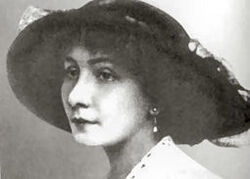
Anna Timiryova in 1915
Scandal
In 1915, Anna met Rear-Admiral Alexander Kolchak. Although, Kolchak was her husband's closest friend and commanding officer, they began a clandestine affair. In 1917, Anna openly left her husband for the Admiral.
Russian Civil War
In years 1918-1919, Anna worked as a translator for the Department of the Business Service of the Council of Ministers. This was a agency attached to Kolchak's anti-communist White Movement in Siberia.
After the arrest of the Admiral Kolchak, Anna approached the Bolsheviks and declared to them: "Arrest me. I cannot live without him." As a result, she was imprisoned in Irkutsk but was released after Kolchak's execution in October, 1920.
The GULAG archipelago
Her freedom did not last, however, and she was once again arrested in May 1921 and sent to a Soviet concentration camp; this scenario was repeated in 1922, in 1925, and 1935. In 1938, during Joseph Stalin's Great Purge, she was deported for eight years, as she was accused of being an enemy of the people. Her son, the avant garde painter Vladimir Timirev, was arrested by the NKVD and shot in 1938. He was reportedly denounced by friends of the family as the "stepson" of Alexander Kolchak.
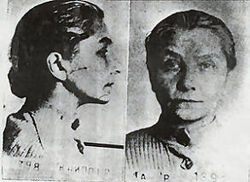
Picture of Anna Timiryova taken by the KGB at her release from prison in 1954
Anna was classified as Minus 12 until 1960, meaning that she was denied the right to live in the largest cities of Russia, near the border or the sea. Between her arrests, she worked as a librarian, an archivist and props maker in a theatre, and survived malaria. After her release, she and her second husband lived in Rybinsk. She was again imprisoned in 1949.
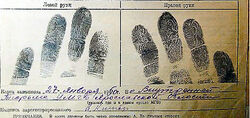
Fingerprints of Anna Timiriova taken by the KGB at her realease from prison in 1954
Khrushchev thaw
Anna worked as a painter in a local theatre and, after being fully rehabilitated, was finally allowed to become established in Moscow. During the early 1960s, Anna worked as a consultant for Sergei Bondarchuk's War and Peace), which appeared on screens in 1966. She died on January 31, 1975.
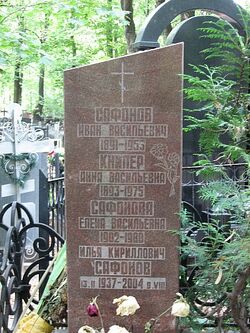
Anna Timiriova's grave in Vagankovo Cemetery, Moscow
In popular culture
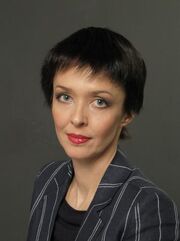
Veronika Izotova as Anna Timiryova in the TV miniseries "The White Horse"
Anna was depicted onscreen by Veronika Izotova in the 1993 miniseries the The White Horse and by Elizaveta Boyarskaya in Admiral (film).
Veronica Izotova recalled,
"I put on a red make-up using a brick. My face was dirty, my sad eyes, my clothes torn, and I have to walk many hours... I wanted to play the Snow Queen. I was always more expressive and more sensitive than the average of my compatriots."
Elizaveta Boyarskaya commented,
"She was a woman of such force, of such will, with such magnanimity... I feel an amazing resemblance to her... When I read script, I was even a bit scared: because she has the same vision of history as me. All that it can arrive at is me. And when I played Anna, I did not play, I was her. It was my epoch, my attitude regarding love.
After being asked about Doctor Zhivago (film), she said,
"The only thing that these two films share consists in the love which the Russian women can carry; it is a topic approached by many novels. They love up to the last drop of blood, till the most dreadful end, to the death; they are capable of leaving family and children for the love of the man which they have chosen."
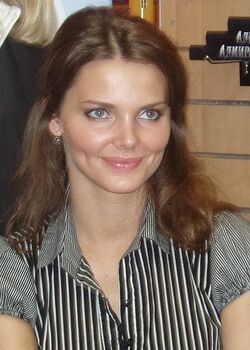
Elizaveta Boyarskaya, who played the role of Anna Timiryova in the Russian film "The Admiral"
Music
The main original song for the film Admiral is called Anna. She is interpreted by the Russian singer Victoria Dayneko. The music of the song was composed by Igor Matvienko and the words were written by Anna Timiryova in memory of her lover, Admiral Kolchak.
Children
| Name | Birth | Death | Joined with |
| Vladimir Timiryov (1914-1938) | |||
Residences
Footnotes (including sources)
| ‡ General |